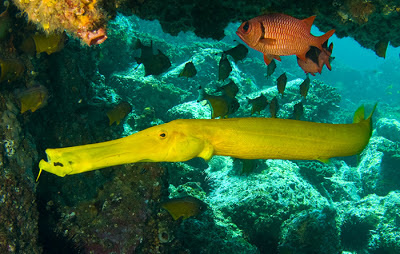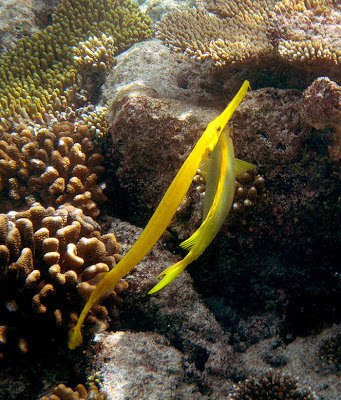The trumpetfish was described and
named by the father of taxonomy, Carolus Linnaeus in 1766. It’s from the family of Trumpetfishes and
species of Aulostomidae. Trumpetfish also known as Trumpet, Atlantic
Trumpetfish, Caribbean Trumpetfish, Trumpeter and Painted Flutemouth
 This reef dweller is easily
recognized by its long body with upturned mouths that often swim vertically
while trying to blend with vertical coral, like sea rods, sea pens, and pipe,
tubular snout, and a barbel on its chin, though it can be brown, green, or
yellow with pales stripes, bar, and spots. The length of the fish can be 80cm
(approx). The fish can easily change its color. Their vertically swimming
tactics helps them to blend in with surrounding sea fans, pipe sponges and sea
whips, thereby hiding from predators.
This reef dweller is easily
recognized by its long body with upturned mouths that often swim vertically
while trying to blend with vertical coral, like sea rods, sea pens, and pipe,
tubular snout, and a barbel on its chin, though it can be brown, green, or
yellow with pales stripes, bar, and spots. The length of the fish can be 80cm
(approx). The fish can easily change its color. Their vertically swimming
tactics helps them to blend in with surrounding sea fans, pipe sponges and sea
whips, thereby hiding from predators. They use stealth and camouflage to
prey on smaller fish, and a typical tactic is to attack from above after
remaining motionless in the water to imitate a piece of coral, stick or weed.
Somewhere the Trumpetfishes are taken for the aquarium trade. Trumpetfish have
the capability to rapidly expand their jaws into a circular gaping hole almost
the diameter of their body when feeding. Till now the spawning habits of the
trumpetfish are unknown, but in the region around
They use stealth and camouflage to
prey on smaller fish, and a typical tactic is to attack from above after
remaining motionless in the water to imitate a piece of coral, stick or weed.
Somewhere the Trumpetfishes are taken for the aquarium trade. Trumpetfish have
the capability to rapidly expand their jaws into a circular gaping hole almost
the diameter of their body when feeding. Till now the spawning habits of the
trumpetfish are unknown, but in the region around 
No comments:
Post a Comment